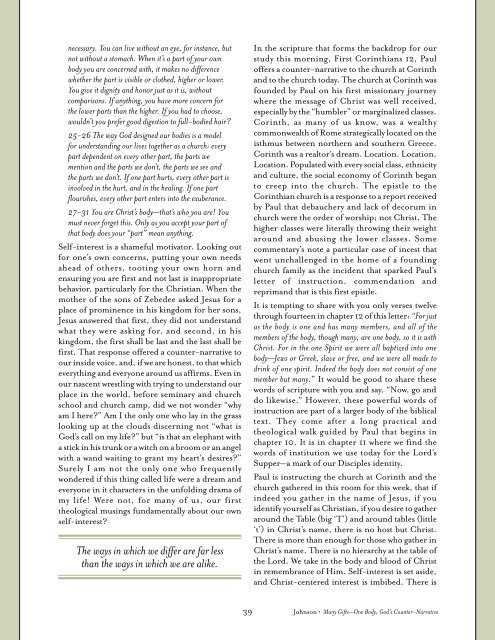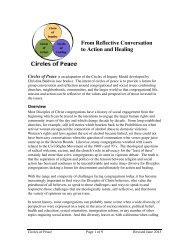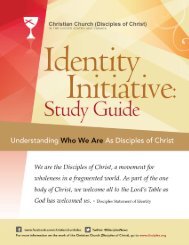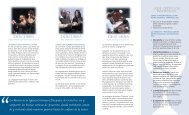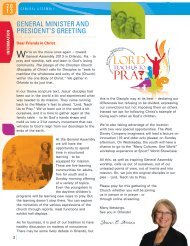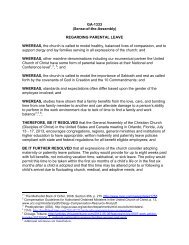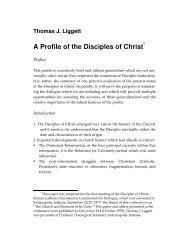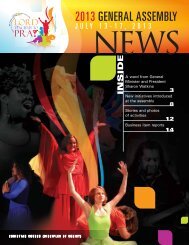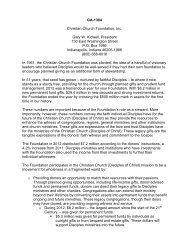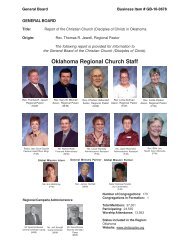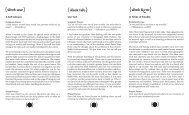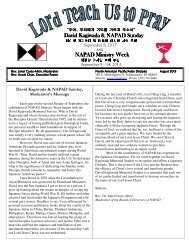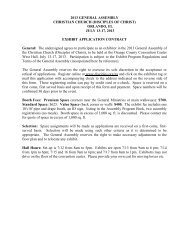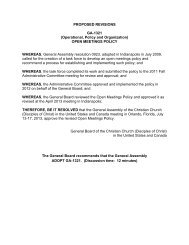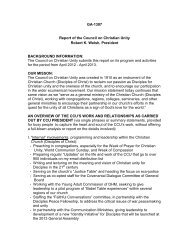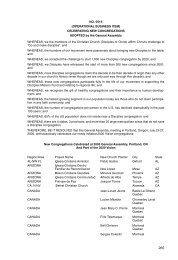RESOURCING THE CHURCH FOR ECUMENICAL MINISTRy A ...
RESOURCING THE CHURCH FOR ECUMENICAL MINISTRy A ...
RESOURCING THE CHURCH FOR ECUMENICAL MINISTRy A ...
You also want an ePaper? Increase the reach of your titles
YUMPU automatically turns print PDFs into web optimized ePapers that Google loves.
necessary. You can live without an eye, for instance, but<br />
not without a stomach. When it’s a part of your own<br />
body you are concerned with, it makes no difference<br />
whether the part is visible or clothed, higher or lower.<br />
You give it dignity and honor just as it is, without<br />
comparisons. If anything, you have more concern for<br />
the lower parts than the higher. If you had to choose,<br />
wouldn’t you prefer good digestion to full-bodied hair?<br />
25-26 The way God designed our bodies is a model<br />
for understanding our lives together as a church: every<br />
part dependent on every other part, the parts we<br />
mention and the parts we don’t, the parts we see and<br />
the parts we don’t. If one part hurts, every other part is<br />
involved in the hurt, and in the healing. If one part<br />
flourishes, every other part enters into the exuberance.<br />
27-31 You are Christ’s body—that’s who you are! You<br />
must never forget this. Only as you accept your part of<br />
that body does your “part” mean anything.<br />
Self-interest is a shameful motivator. Looking out<br />
for one’s own concerns, putting your own needs<br />
ahead of others, tooting your own horn and<br />
ensuring you are first and not last is inappropriate<br />
behavior, particularly for the Christian. When the<br />
mother of the sons of Zebedee asked Jesus for a<br />
place of prominence in his kingdom for her sons,<br />
Jesus answered that first, they did not understand<br />
what they were asking for, and second, in his<br />
kingdom, the first shall be last and the last shall be<br />
first. That response offered a counter-narrative to<br />
our inside voice, and, if we are honest, to that which<br />
everything and everyone around us affirms. Even in<br />
our nascent wrestling with trying to understand our<br />
place in the world, before seminary and church<br />
school and church camp, did we not wonder “why<br />
am I here?” Am I the only one who lay in the grass<br />
looking up at the clouds discerning not “what is<br />
God’s call on my life?” but “is that an elephant with<br />
a stick in his trunk or a witch on a broom or an angel<br />
with a wand waiting to grant my heart’s desires?”<br />
Surely I am not the only one who frequently<br />
wondered if this thing called life were a dream and<br />
everyone in it characters in the unfolding drama of<br />
my life! Were not, for many of us, our first<br />
theological musings fundamentally about our own<br />
self-interest?<br />
The ways in which we differ are far less<br />
than the ways in which we are alike.<br />
39<br />
In the scripture that forms the backdrop for our<br />
study this morning, First Corinthians 12, Paul<br />
offers a counter-narrative to the church at Corinth<br />
and to the church today. The church at Corinth was<br />
founded by Paul on his first missionary journey<br />
where the message of Christ was well received,<br />
especially by the “humbler” or marginalized classes.<br />
Corinth, as many of us know, was a wealthy<br />
commonwealth of Rome strategically located on the<br />
isthmus between northern and southern Greece.<br />
Corinth was a realtor’s dream. Location. Location.<br />
Location. Populated with every social class, ethnicity<br />
and culture, the social economy of Corinth began<br />
to creep into the church. The epistle to the<br />
Corinthian church is a response to a report received<br />
by Paul that debauchery and lack of decorum in<br />
church were the order of worship; not Christ. The<br />
higher classes were literally throwing their weight<br />
around and abusing the lower classes. Some<br />
commentary’s note a particular case of incest that<br />
went unchallenged in the home of a founding<br />
church family as the incident that sparked Paul’s<br />
letter of instruction, commendation and<br />
reprimand that is this first epistle.<br />
It is tempting to share with you only verses twelve<br />
through fourteen in chapter 12 of this letter: “For just<br />
as the body is one and has many members, and all of the<br />
members of the body, though many, are one body, so it is with<br />
Christ. For in the one Spirit we were all baptized into one<br />
body—Jews or Greek, slave or free, and we were all made to<br />
drink of one spirit. Indeed the body does not consist of one<br />
member but many.” It would be good to share these<br />
words of scripture with you and say, “Now, go and<br />
do likewise.” However, these powerful words of<br />
instruction are part of a larger body of the biblical<br />
text. They come after a long practical and<br />
theological walk guided by Paul that begins in<br />
chapter 10. It is in chapter 11 where we find the<br />
words of institution we use today for the Lord’s<br />
Supper—a mark of our Disciples identity.<br />
Paul is instructing the church at Corinth and the<br />
church gathered in this room for this week, that if<br />
indeed you gather in the name of Jesus, if you<br />
identify yourself as Christian, if you desire to gather<br />
around the Table (big ‘T’) and around tables (little<br />
‘t’) in Christ’s name, there is no host but Christ.<br />
There is more than enough for those who gather in<br />
Christ’s name. There is no hierarchy at the table of<br />
the Lord. We take in the body and blood of Christ<br />
in remembrance of Him. Self-interest is set aside,<br />
and Christ-centered interest is imbibed. There is<br />
Johnson • Many Gifts—One Body; God’s Counter-Narrative


